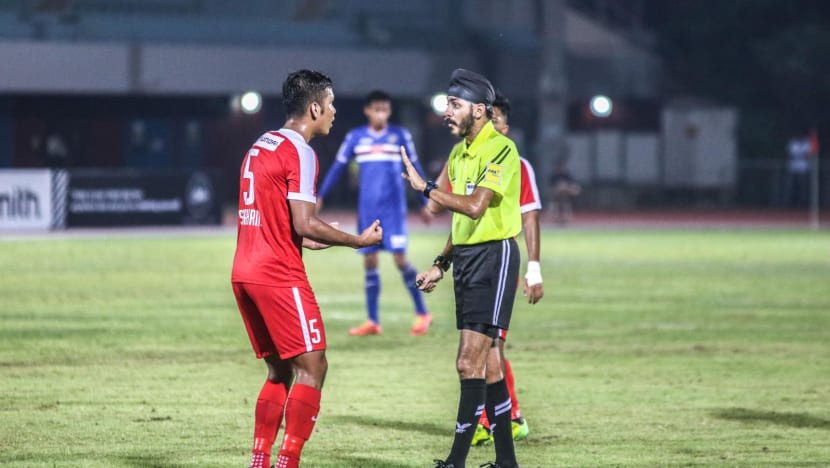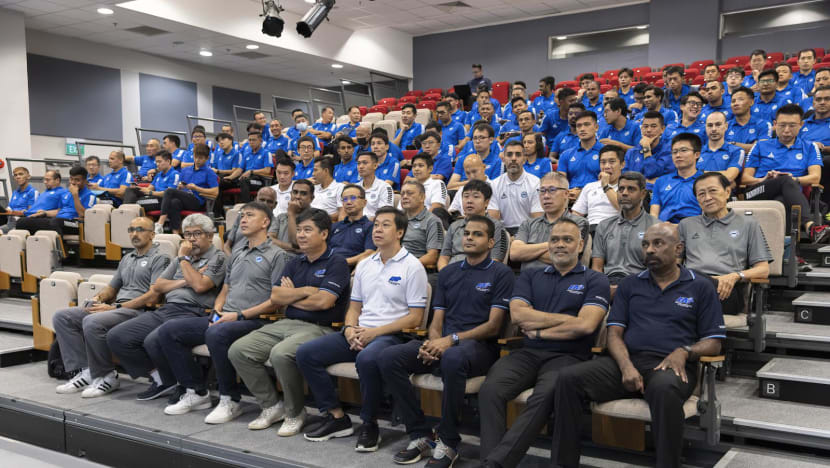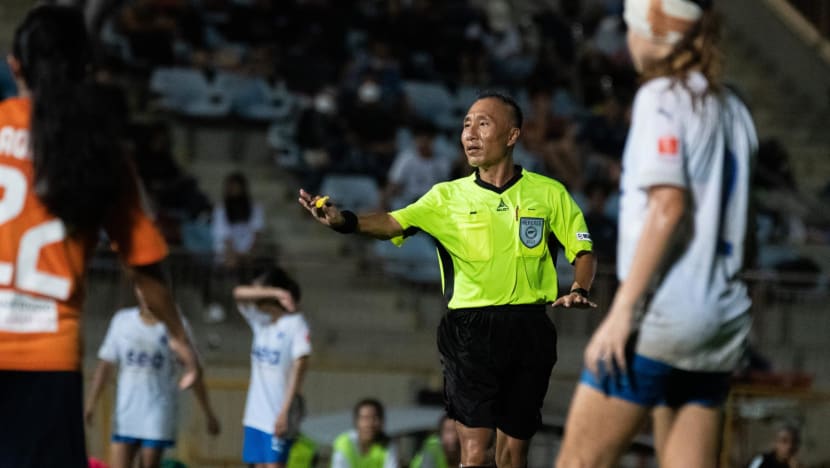Singapore football association considers fitting referees with body cameras to tackle abuse
Out of 14 disciplinary cases that the Football Association of Singapore dealt with last year, 10 involved verbal abuse or violent conduct towards referees.

Referee Sukhbir Singh speaking to Young Lions footballer Shahrin Saberin during an S.League match against Warriors FC on Apr 8, 2017. (Photo: Football Association of Singapore)

This audio is generated by an AI tool.
SINGAPORE: The Football Association of Singapore (FAS) is exploring the use of body cameras to protect match officials from abuse, after a majority of disciplinary cases that it handled last year involved physical or verbal abuse against referees.
The national football body is also ramping up education efforts among club officials, coaches, players and referees in its bid to stamp out such acts.
Referees told CNA about their experiences being abused on and off the pitch, especially in the current age of social media.
Mr Wan Tung Han, 54, has a decade of refereeing experience under his belt and is one of the oldest referees in Singapore football.
He took up the role when he and some teammates realised they did not understand decisions made by the referees during their social matches.
“It helped to keep myself in good fitness and I do understand the commitment, the passion, and how the game is being played by teams,” he added.
“I feel that all these 10 years of being a match official … brought me things that in a corporate platform, I don’t get to enjoy.”
Last year, however, Mr Wan was subjected to abuse for the first time.
During a lower-league match played by amateur footballers, he had to send off a player for repeatedly using vulgar language. Upon seeing the red card, the player proceeded to headbutt him.
The player was later fined S$300 (US$220) by the FAS’ disciplinary committee and banned from the sport in Singapore for a year.
EDUCATIONAL SESSIONS, TRAINING
While things can get heated in the professional-tier Singapore Premier League (SPL) as well, assault and verbal abuse remain rare.
To tackle such abuse, the FAS recently began holding sessions where players and coaches are briefed on how to effectively communicate during a match, among others. The association started having periodic engagements with SPL clubs last year.
At this year’s edition of the annual Referees Connect event in January, club officials, coaches and players from the SPL sat down with referees to better understand one another and the rules of the game.
FAS aims to hold such sessions for lower and amateur leagues from this year onwards.

Meanwhile, match officials get regular training to ensure they keep up to date with the laws of the game, such as how handballs are sanctioned.
As for new ways to deter abuse, FAS said it will possibly fit referees with body cameras in the future – something that is already being trialled in the United Kingdom at the grassroots level.
Mr Sukhbir Singh, who is a manager at FAS’ referee department, noted that while referees are human and make mistakes, any abusive or violent reaction to that “is definitely not acceptable”.
The association always urges teams and players to use the avenues available to them to seek redress, he added.
Out of 14 disciplinary cases that the FAS dealt with last year, 10 involved verbal abuse or violent conduct towards referees.
“I think this is definitely something that’s very concerning. However, I think what comes here is also the opportunity to look and see why things have become the way they are,” said Mr Singh, who was a referee himself from 2004 to 2018.
He stressed the importance of match officials being able to address any doubts that players have, in order to avoid them becoming upset.
“Even if we go and ask a question at the customer service counter … if you don't get an answer that you want, you're going to leave upset and that may spark something,” he pointed out.
“But if you go to that individual and you ask for clarification, and you get it, you leave happy or you may (be) just like, okay, it's the way it is. That feeling doesn't turn into something else.”

ABUSE ON SOCIAL MEDIA
Apart from incidents on the pitch, abuse can continue long after the final whistle. In the early days of Mr Singh’s refereeing career, social media was not an issue – unlike today.
"I cannot say that nobody gets affected (by) what they read. But at the end of the day, our advice to our referees, our match officials is that we have our monthly and sometimes personal one-to-one coaching sessions after the match,” Mr Singh said.
This is when referee coaches, who are well-versed with the laws of the game and how to apply them, can provide advice.
For Mr Wan, the headbutting incident was unfortunate but it did not take the joy of refereeing out of him.
"Football is a beautiful game, so when teams play fairly, cleanly, and respect each other, it is very fulfilling,” he said.
“We get all forms of abuse, so I just hope the public, the players and coaches know that we referees are also humans. We do make mistakes, so just be more forgiving and also be more respectful to each other."
















